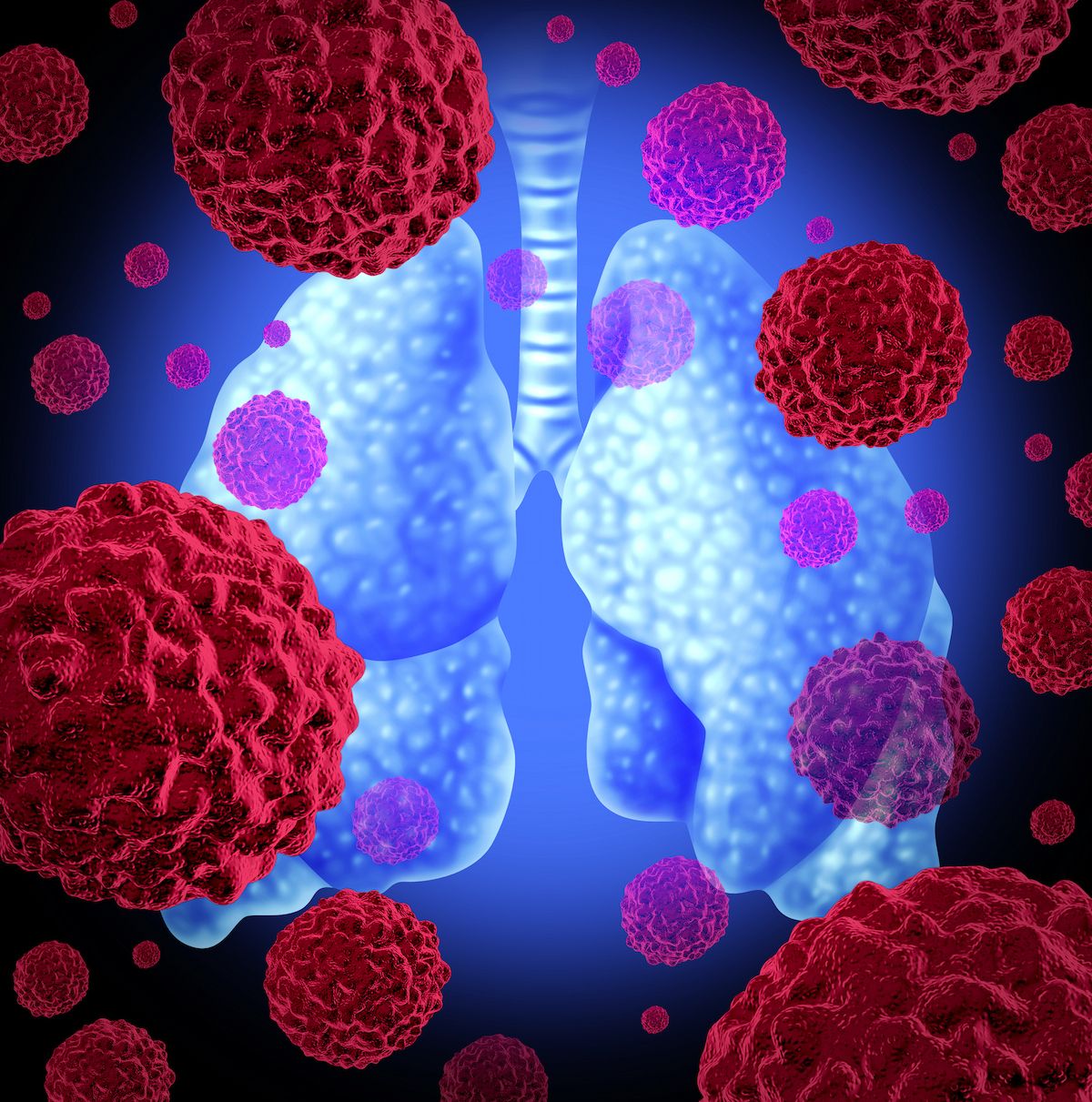Lazertinib Shows Encouraging Intracranial ORR in EGFR NSCLC with CNS Metastases
Regardless of T790M status, lazertinib hindered the progression of intracranial metastases after unsuccessful EGFR TKI treatment in patients with EGFR-mutated NSCLC.
Regardless of T790M status, lazertinib hindered the progression of intracranial metastases after unsuccessful EGFR TKI treatment in patients with EGFR-mutated NSCLC.

Lazertinib (Leclaza) elicited an encouraging intracranial objective response rate (iORR) in patients with EGFR-variant non-small cell lung cancer (NSCLC) and central nervous system (CNS) metastases after prior treatment with first- and second- generation EGFR tyrosine kinase inhibitors (TKIs), according to findings from a phase 2 trial (NCT05326425) published in JAMA Oncology.
Topline data revealed overall iORR across patient groups was 55% (95% CI, 38.3%-71.4%) with confirmed complete response (CR) in 3 patients and a partial response (PR) in 18. For patients with T790M-positive disease the iORR was 80% (95% CI, 28.4%-99.5%) and 43% (95% CI, 21.8%-66.0%) for T790M-negative disease, with an iORR of 67% (95% CI, 34.9%-90.1%) for patients with unknown status.
Overall intracranial progression-free survival (iPFS) was 15.8 months (95% CI, 15.2-not reached [NR]), 15.2 months (95% CI, 4.2-NR), 15.4 months (95% CI, 7.9-NR), and 18.0 months (95% CI, 3.9-NR) for T790M-positive, T790M-negative, and T790M-unknown patients, respectively. Blood-brain barrier penetration was 46.2% (95% CI, 26.1%-58.66%) and 33.1% (95% CI, 15.1-%=51.5%) for metabolite rate when paired with cerebrospinal fluid and plasma samples. These data suggest high CNS penetration.
“Lazertinib showed a clinically meaningful intracranial response, with an iORR of 55% and an iPFS of 15.8 months, successfully achieving its primary end point. For overall response, an ORR of 40% and a PFS of 15.2 months were observed,” wrote Min Hee Hong, MD, associate professor at the Department of Internal Medicine at Yonsei University in Seoul, South Korea, with study coinvestigators in the publication. “The safety profile of lazertinib in this study remained consistent with findings from other previous studies, and no new AEs were identified. Most AEs were manageable at grades 1 or 2, and no grade 5 [toxicities] were reported.”
The single-arm nonrandomized controlled phase 2 trial enrolled 40 patients with EGFR-variant metastatic NSCLC after first- or second-generation EGFR TKIs failed to treat brain metastases characterized as mildly symptomatic or asymptomatic. Of the initial 40, 38 patients were evaluated after 1 patient withdrew consent before initial tumor evaluation and another experienced rapid tumor progression and died. Patients received 240 mg lazertinib once daily, with a dose reduction to 160 mg permitted after incidence of an adverse effect.
Treatment cycles lasted 42 days, with tumor response assessed after the first 4 cycles per Response Evaluation Criteria in Solid Tumors (RECIST) v. 1.1. Following the fourth cycle, evaluations were conducted at the conclusion of every other cycle. Treatment persisted until disease progression, serious protocol noncompliance, withdrawal of consent, or preclusion to study participation.
The primary end point was iORR. Secondary end points included iPFS, iORR for T790M-negative disease and isolated CNS progression, overall ORR and duration of response (DOR), iDOR, disease control rate (DCR), and overall survival (OS), among other end points.
Overall iDCR was 97% (95% CI, 86.2%-99.9%), including 100% in both T790M-positive (95% CI, 47.8%-100%) and T790M-unknown (95%, 73.5%-100%) groups and 95.2% (95% CI, 76.2%-99.9%) for T790M-negative patients. Among asymptomatic and mildly symptomatic patients, median PFS was not reached (IQR, 15.2-NR) and 15.4 months (IQR, 3.9-15.8), respectively.
Confirmed partial responses occurred in 15 patients, with no complete responses observed. ORR was 60% (n = 3/5) and 33% (n = 7/21) among T790M-positive and T790M-negative patients, respectively. Furthermore, the median overall PFS was 15.2 months (95% CI, 7.3-18.0), including 9.9 months (95% CI, 4.2-NR), 15.2 months (95% CI, 7.1-15.8), and 18.0 months (95% CI, 3.9-NR) for T790M-positive, T790M-negative, and T790M-unknown patients, respectively.
Reference
Hong MH, Choi YJ, Ahn HK, et al. Lazertinib in EGFR-variant non–small cell lung cancer with CNS failure to prior EGFR tyrosine kinase inhibitors: a nonrandomized controlled trial. JAMA Oncol. Published online August 15, 2024. doi:10.1001/jamaoncol.2024.2640